Job satisfaction among medical staff with particular reference to the nurses
DOI:
https://doi.org/10.12923/p21w-2015-2/21Keywords:
job satisfaction, work, nurses, medical staffAbstract
JOB SATISFACTION AMONG MEDICAL STAFF WITH PARTICULAR REFERENCE TO THE NURSES
Introduction. The higher the doctors’ and nurses’ work satisfaction rates are, the better the quality of patient care. There are many factors influencing job satisfaction. Low salaries, working environment, relations with superiors, working hours and low prestige, especially of the nursing job is the main causes of dissatisfaction. Measuring the nurses’ professional satisfaction and constant improvements in this field are necessary.
Aim. The aim of the work was to assess the level of job satisfaction among the medical staff.
Material and methods. The research was conducted on a group of health care employees of different hospitals in Lublin, Warszawa and Tarnobrzeg – 73 people selected at random. A diagnostic survey using the authors’ own questionnaires was applied.
Results. The vast majority (83.5%) of the medical staff likes their job. Among those respondents, some 84.9%, take satisfaction from their work. Practically every respondent is dissatisfied with the salaries they receive – 94.5%. Working conditions at the place of employment are usually satisfactory. The vast majority (89%) of the respondents declared that the work they do makes them tired.
More than a half of the respondents have determined their job as dangerous. Fifty six per cent of them were likely to recommend a medical profession as a career choice to the next generation of students.
Conclusions. Medical staff declare that they like their work and feel satisfied with it. The vast majority of medical staff is not satisfied with their salary. There is a relationship between relations with the superior and the fact that an employee likes their work.
References
1. Rotter I, Kemicer-Chmielewska E, Lipa P, i wsp. Assessment of psychosocial work conditions of nurses at selected hospital wards. Med. Pracy. 2014; 65(2): 173-179.
2. Kaniewska E, Stawny P. Satysfakcja zawodowa pracowników sektora ochrony zdrowia. Pielęgniarstwo Pol. 2012; 2(44): 81-84.
3. Atefi N, Abdullah KL, Wong LP, et al. Factors influencing registered nurses perception of their overall job satisfaction: a qualitative study. Int. Nurs. Rev. 2014; 61:352-360.
4. Curtis EA, Glacken M. Job satisfaction among public health nurses: a national survey. J Nurs. Manag. 2014; 22: 653-663.
5. Jiang H, Li Ch, Gu Y, et al. Nurse satisfaction and burnout in Shandhai neurology wards. Rehabil. Nurs. 2014; 0: 1-8.
6. Goh Y, Lee A, Chan SW, et al. Profiling nurses’ job satisfaction, acculturation, work environment, stress, cultural values and coping abilities: A cluster analysis. Int. J Nurs. Pract. 2014; 2: 1-10.
7. Gurkova E, Harokova S, Dzuka J, et al. Job satisfaction and subjective well-being among Czech nurses. Int. J Nurs. Pract. 2014; 20: 194-203.
8. Kęcka K, Jasińska M, Brzeźniak H, i wsp. Tożsamość zawodowa pielęgniarek i położnych. Fam. Med. Prim. Care Rev. 2011; 13(4): 719-723.
9. Mbaruku GM, Larson E, Kimweri A, et al. What elements of the work environment are most responsible for health worker dissatisfaction in rural primary care clinics in Tanzania? Hum. Resour. Health. 2014; 12: 1-9.
10. Engeda EH, Birhanu AM, Elene KA. Intent to stay in the nursing profession and associated factors among nurses working in Amhara Regional State Referral Hospitals, Ethiopia. BMC Nurs. 2014; 13: 1-8.
11. Kaur S, Sharma R, Talwar R et al. A study of satisfaction and work environment perception among doctors in a tertiary hospital in Delhi. Indian J Med. Sci. 2009; 63: 139-44.
12. Kunecka D. Satysfakcja pracownika a jakość usług medycznych. Probl. Hig. Epidemiol. 2010; 91(3): 451-457.
13. Szreter B. Czy lubisz być pielęgniarką? Mag. Pielęgniarki i Położnej. 2012; 5: 6-7.
14. Ghiyasvandian S, Gebra AA. Coping work strategies and job satisfaction among Iranian nurses. Iran Red. Crescent Med. J. 2014; 16(6): 1-7.
15. McNeese-Smith DK, VanServellen G. Age developmental, and job stage influences on nurse outcomes. Outcomes Manag. Nurs. Pract. 2000; 4: 97-104.
16. Shader K, Broome M, Broome CD, et al. Factors influencing satisfaction and anticipated turnover for nurses in an academic medical center. J Nurs. Adm. 2001; 31: 210-216.
17. Chan MF, Luk All, Leong SM, et al. Factors influencing Macao nurses intention to leave current employment. J Clin. Nurs. 2009; 18: 893-901.
18. Warshawsky NE, Havens DS. Nurse manager Job satisfaction and intent do leave. Nurs. Econ. 2014; 32: 32-39.
19. Plomp HN, Van der Beek AJ. Job satisfaction of occupational physicians In commercial and Rother delivery settings: a comparative and explorative study. Int. J Occup Med. Environ. Health. 2014; 27(4): 672-682.
Downloads
Published
Issue
Section
License
Copyright (c) 2024 Dorota Kozak-Putowska, Michał Putowski, Jolanta Piskorz, Gustaw Wójcik (Autor)

This work is licensed under a Creative Commons Attribution 4.0 International License.




